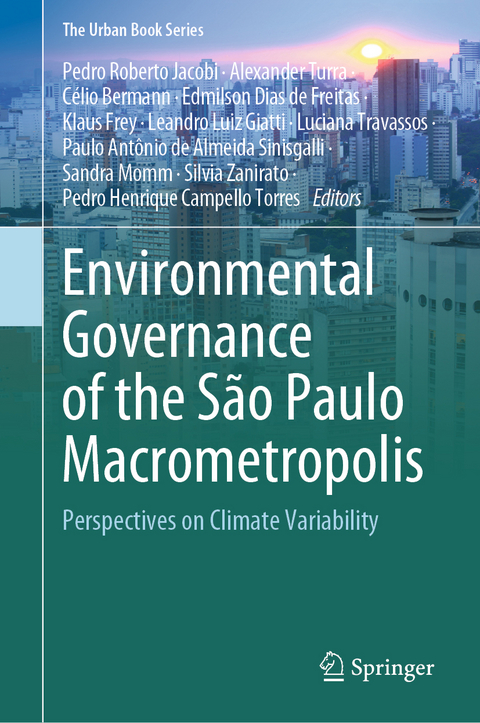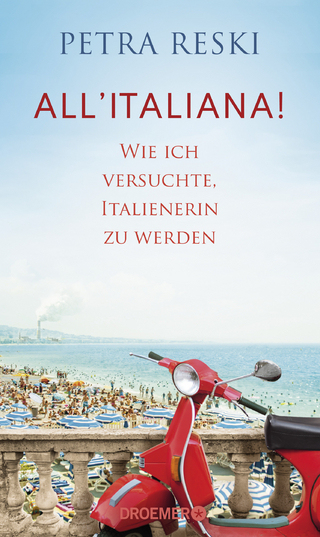
Environmental Governance of the São Paulo Macrometropolis
Springer International Publishing (Verlag)
978-3-031-59610-0 (ISBN)
The SPMM is characterized by the diversity and complementarity of economic, social and environmental functions exercised in its territory, comprising 174 municipalities, with the capital city of São Paulo as its polarizing center. It is structured from a set of five metropolitan regions, two urban agglomerates and one micro-region-not institutionalized-in the State of São Paulo, sheltering around 34 million people who inhabit the richest and economically strongest region in Brazil. The SPMM, one of the urban territorial clusters of greatest expression in the southern hemisphere, is a strategic arena for the formulation and implementation of planning, governance and trans- and multi-scalar regional public policies.
The English translation of this book from its Portuguese original manuscript was done with the help of artificial intelligence. A subsequent human revision of the content was done by the volume editors.
Pedro Roberto Jacobi is a senior full professor at the Institute of Energy and Environment of the University of Sâo Paulo and researcher at the Institute of Advanced Studies of the University of São Paulo. He has international expertise with environmental governance, water governance, climate justice, environmental education for sustainability and social learning. His experience is strongly anchored in national and international collaborative research through interdisciplinary approaches in Brazil as well as in the Latin American context. He has longtime time advisory experience with graduate and post-doctoral students. He has been an editor of the journal Ambiente e Sociedade since 1997, a member of advisory boards of several scientific institutions and journals and president of South America board of ICLEi-Local Governments for Sustainability since 2011.
Alexander Turra is a full professor at the Oceanographic Institute of the University of São Paulo (IOUSP) and coordinator of the UNESCO Chair on Ocean Sustainability, based at the Oceanographic Institute and the Institute of Advanced Studies at the University of São Paulo. Turra is a biologist who exercises interdisciplinary and integrated research, focusing on themes such as marine biodiversity, governance, integrated management, marine conservation, environmental impact assessment, climate change and marine pollution (marine litter). Turra seeks to promote the integration between science and society, policymakers and the private sector to support public policies, technological development and innovation applied to the ocean.
Célio Bermann is an associate professor at the Institute of Energy and Environment of the University of São Paulo and coordinator of the Energy Governance Research Group, certified by the CNPq-Brazilian National Council for Scientific and Technological Development. He has experience in the field of fuels and electricity, with an emphasis on energy and environment, working mainly on the following themes: energy policy, energy planning, energy alternatives, energy and society and energy sustainability. He is an accredited professor in the Graduate Program in Energy and in the Graduate Program in Environmental Science at USP where he advised theses and dissertations of graduate students and also supervised post-doctoral partners.
Edmilson Dias de Freitas is a full professor at the Institute of Astronomy, Geophysics and Atmospheric Sciences of the University of São Paulo, working in the fields of biosphere-atmosphere interactions and numerical modeling of the atmosphere. Dr. Edmilson has worked on issues related to urban regions and their interactions with the surrounding areas and associated atmospheric circulations, including air quality and pollution dispersion during wintertime and severe weather during the summer, and the application of model results to the public policy establishment and actions of civil protection. He was one of the developers of the BRAMS mesoscale model.
Klaus Frey is a full professor at the Federal University of the ABC (UFABC), Brazil, at the Postgraduate Programs in Territorial Planning and Management as well as in Public Policies. The latter he coordinated from 2013 to 2017. He currently also coordinates the International Master SPRING at UFABC, a joint master program between Technical University Dortmund, UFABC, and other four universities in Chile, Tanzania, Ghana and the Philippines. He was a visiting professor at the Master in Urban Management at Unipiloto in Bogota, Colombia and at the Postgraduate Program 'Programming and Management of the Political and the Social Services' at University Milano-Bicocca. He is a researcher at the Brazilian National Research Council (CNPQ), working specifically on the following subjects: local and metropolitan governance, institutional analysis, policy networks, democracy and particip
Part 1: Environmental sanitation governance.- Environmental sanitation in the São Paulo Macrometrópolis in view of climate change.- Nexus for urban resilience in the face of climate change: Policies and synergies in the context of a macrometropolis.- Water security, climate change and the Paulista Macrometropole: Challenges from a critical perspective.- Social and socio-environmental indicators and challenges for São Paulo Macrometropolis.- Part 2: Territorialities, spatialities and innovation in environmental governance.- Planning in the São Paulo Macrometropolis: Research balance and emerging themes.- Tekoá and the São Paulo Macrometropolis: Reflections on the social production of space.- System, practices, and culture of environmental planning in the São Paulo Macrometropolis in context of climate change: Debate from the planning artifacts.- From the social construction of risks to the sociotechnical transition: Discussing possibilities to face urban floods in the SPMM.- Part 3: Small towns in a metropolized space.- Social-environmental vulnerability and adaptive capacity of SPMM's small cities in the face of climate emergency.- Protected areas and local development: Limits and possibilities in the small towns of the metropolitan region of the Paraíba Valley and Northern Coast in the São Paulo Macrometropolis.- Water security of rural populations in the São Paulo Macrometropolis.- Adaptation to climate variability in the São Paulo Macrometropolis: A debate from climate justice perspective.- Part 4: São Paulo city's urbanization evolution and its impact on the regional atmospheric patterns: Numerical simulations of present and future climate.- Relationship between urbanization and precipitation in the São Paulo Macrometropolis.- Contribution of CMIP models in the formulation of adaptive public policies.- Hydrological modeling of urbanized basins.- Land use and land cover changes in the São Paulo Macrometropolis.- Climate shift: An approach to its effects on the rainfall regime.- Part 5: The governance of energy issues in the context of the SPMM.- Smart cities: Limits and possibilities in the São Paulo Macrometropolis.- Energy justice and distributed photovoltaic power generation in São Paulo.- The context and evolution of the distributed generation in the São Paulo Macrometropolis.- Part 6: The ecosystem services approach in the dynamics of environmental governance.- Critical discussion of the concept of ecosystem services at São Paulo Macro Metropolis.- Economic, ecological and social-cultural ecosystem services valuation: Contributions, limits and theoretical disputes.- Models, tools and instruments for ecosystem services assessment and support for decision making process in a macrometropolitan scale.- Public policies, ecosystem services and environmental governance in Brazil: An analytical review of public policies at legal, social, and institutional arrangements, at the federal, state, and municipal levels.- Part 7: Social learning in the MacroAmb project.- Dialogue and social learning: Analyzing the challenges of integrating different knowledges in an interdisciplinary research.- Synthesis and final words of the book.
| Erscheinungsdatum | 27.07.2024 |
|---|---|
| Reihe/Serie | The Urban Book Series |
| Zusatzinfo | XXXVI, 391 p. 19 illus., 16 illus. in color. |
| Verlagsort | Cham |
| Sprache | englisch |
| Original-Titel | Governança ambiental na macrometrópole paulista face à variabilidade climática |
| Maße | 155 x 235 mm |
| Themenwelt | Sozialwissenschaften ► Politik / Verwaltung ► Politische Systeme |
| Sozialwissenschaften ► Politik / Verwaltung ► Staat / Verwaltung | |
| Schlagworte | Adaptation • City-Region • climate change • Climate Change Management • coastal regions • Ecosystem services • Energy • Interdisciplinarity • sustainable development • Territorial Planning |
| ISBN-10 | 3-031-59610-2 / 3031596102 |
| ISBN-13 | 978-3-031-59610-0 / 9783031596100 |
| Zustand | Neuware |
| Informationen gemäß Produktsicherheitsverordnung (GPSR) | |
| Haben Sie eine Frage zum Produkt? |
aus dem Bereich


